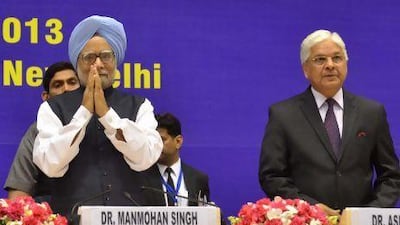NEW DELHI // Pressure is building on three top Indian government officials to resign after they were accused of involvement in a bribery scandal, lying to the supreme court and manipulating a corruption investigation.
The minister for railways, Pawan Kumar Bansal, is likely to be questioned soon by the Central Bureau of Investigation (CBI) about his role in his nephew's alleged acceptance of 9 million rupees (Dh610,000) to expedite the promotion of a railway official. Mr Bansal's nephew was arrested by the CBI on Saturday.
At the same time, the law minister, Ashwani Kumar, and attorney general, GE Vahanvati, were accused in March of interfering in a CBI investigation into how the government allocated coal-mining rights.
Mr Vahanvati and Mr Kumar are accused of having made changes in a draft CBI report on the case to protect the government. Mr Vahanvati is also believed to have misled the supreme court during a recent deposition, when he claimed that he had never seen the CBI report.
The opposition Bharatiya Janata Party (BJP) has gleefully taken advantage of the whiff of scandal swirling around the senior members of the Congress-led government.
"There is no morality left in this government," Ravi Shankar Prasad, a BJP spokesman, said on Sunday.
The BJP, Mr Prasad said, was calling for the resignation of the two ministers "on behalf of the people of India".
The government was protecting Mr Bansal and Mr Kumar, he continued, because "they know [that] as soon as these ministers are out, the prime minister will be in the direct line of fire".
Yesterday, the BJP announced that it would prevent parliament from acting on any legislation until Mr Kumar and Mr Bansal step down.
So far, the government is insisting that investigations and court proceedings should be allowed to run their course.
On Sunday, Manish Tewari, the junior minister for information and broadcasting, in a statement said: "As far as the rail minister is concerned, a probe is under way… We cannot prejudge the issue till the investigation is over."
The court was already hearing the case involving Mr Kumar, and no action would be taken until the court had delivered its verdict, Mr Tewari said.
Speaking about his nephew, Mr Bansal in a statement said: "Though a close relative, he or any other relative of mine does not and cannot meddle in my official function or influence my decision. There is also no business relationship between his and my family."
But even the Samajwadi Party, a regional party that frequently supports the Congress party-led government, has called for Mr Bansal's resignation.
"When non-Congress officials are caught, they are quickly investigated. But Congress ministers accused of corruption are protected," said Ram Gopal Yadav, a Samajwadi spokesman. "This is a serious matter and Pawan Bansal cannot be protected for long. He will have to be sacked."
The accusations against Mr Kumar and Mr Vahanvati will be further examined today when the supreme court considers an affidavit filed by Ranjit Sinha, the director of the CBI, in which he claims the two men did nothing improper.
In the affidavit, Mr Sinha states that the changes in the draft report ordered by Mr Kumar "neither altered the central theme of the report nor shifted the focus of inquiries or investigations in any manner … No names of suspects or accused were removed."
Mr Sinha also claimed that nothing in the CBI manual indicated whether the agency could share draft reports with the government.
But Nikhil Mehra, a lawyer practising in the supreme court, said Mr Sinha was suggesting "that what is not specifically barred is permitted".
In a court-monitored investigation such as this one, Mr Mehra said, "and where the accused is the executive, the CBI has no mandate to share the report with anyone other than the court".
"It's like asking me to vet and edit a report that accuses me of an offence," he added.
Mr Sinha's claim also appears to violate a 1996 ruling by the supreme court that ordered the CBI not to "take any instructions from, report to, or furnish any particular thereof to any authority personally interested in or likely to be affected by the outcome of the investigation into any accusation".
If the government were given the opportunity to edit the CBI's report, Mr Mehra pointed out, "it is effectively interfering with the investigation".
twitter: For breaking news from the Gulf, the Middle East and around the globe follow The National World. Follow us

